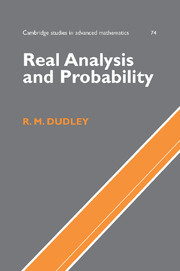Book contents
- Frontmatter
- Contents
- Preface to the Cambridge Edition
- 1 Foundations; Set Theory
- 2 General Topology
- 3 Measures
- 4 Integration
- 5 Lp Spaces; Introduction to Functional Analysis
- 6 Convex Sets and Duality of Normed Spaces
- 7 Measure, Topology, and Differentiation
- 8 Introduction to Probability Theory
- 9 Convergence of Laws and Central Limit Theorems
- 10 Conditional Expectations and Martingales
- 11 Convergence of Laws on Separable Metric Spaces
- 12 Stochastic Processes
- 13 Measurability: Borel Isomorphism and Analytic Sets
- Appendix A Axiomatic Set Theory
- Appendix B Complex Numbers, Vector Spaces, and Taylor's Theorem with Remainder
- Appendix C The Problem of Measure
- Appendix D Rearranging Sums of Nonnegative Terms
- Appendix E Pathologies of Compact Nonmetric Spaces
- Author Index
- Subject Index
- Notation Index
- References
Appendix E - Pathologies of Compact Nonmetric Spaces
Published online by Cambridge University Press: 06 July 2010
- Frontmatter
- Contents
- Preface to the Cambridge Edition
- 1 Foundations; Set Theory
- 2 General Topology
- 3 Measures
- 4 Integration
- 5 Lp Spaces; Introduction to Functional Analysis
- 6 Convex Sets and Duality of Normed Spaces
- 7 Measure, Topology, and Differentiation
- 8 Introduction to Probability Theory
- 9 Convergence of Laws and Central Limit Theorems
- 10 Conditional Expectations and Martingales
- 11 Convergence of Laws on Separable Metric Spaces
- 12 Stochastic Processes
- 13 Measurability: Borel Isomorphism and Analytic Sets
- Appendix A Axiomatic Set Theory
- Appendix B Complex Numbers, Vector Spaces, and Taylor's Theorem with Remainder
- Appendix C The Problem of Measure
- Appendix D Rearranging Sums of Nonnegative Terms
- Appendix E Pathologies of Compact Nonmetric Spaces
- Author Index
- Subject Index
- Notation Index
- References
Summary
Recall that a topological space is called locally compact iff every point in it is contained in some open set with compact closure. For some time, locally compact spaces were considered the most natural spaces on which to study general measures and integrals. The regularity extension, treated in §7.3, appeared as a primary advantage of measures on compact or locally compactspaces. Local compactness also fits well with group structures. A topological group is a group G with a Hausdorff topology for which the group operations 〈g, h〉 ↦ gh and g ↦ g−1 are continuous. A locally compact Hausdorff topological group has left and right Haar measures, which are Radon measures (finite on compact sets) invariant under all left or right translations g ↦ hg or g ↦ gh, respectively. The theory of measures on locally compact spaces, particularly groups, occupied the last three of the twelve chapters of the classic text of Halmos (1950). Bourbaki (1952–1969) put even more emphasis on locally compact spaces. The main purpose of this appendix is to indicate why locally compact spaces have had less attention in this book than in those of Halmos and Bourbaki.
Another class of spaces for measures theory is complete separable metric spaces, or topological spaces which can be metrized to be separable and complete (Polish spaces). Among such spaces, for example, are separable, infinite-dimensional Banach spaces, none of which is locally compact.
- Type
- Chapter
- Information
- Real Analysis and Probability , pp. 530 - 540Publisher: Cambridge University PressPrint publication year: 2002



